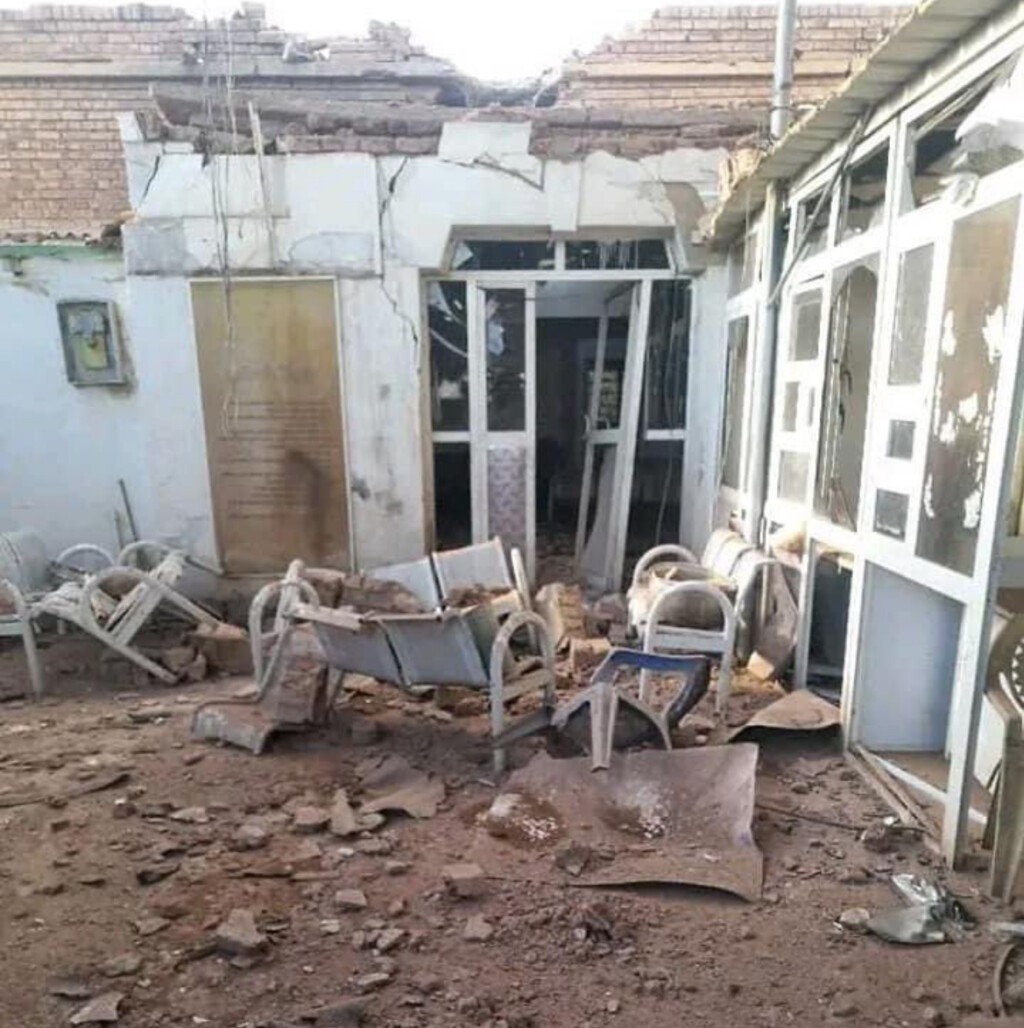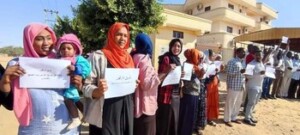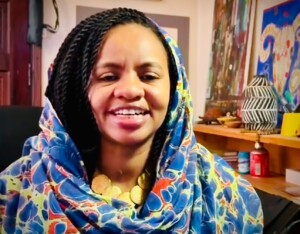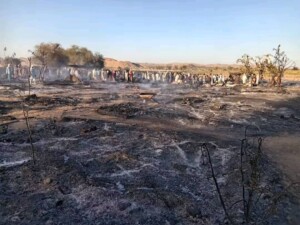Omdurman: A microcosm of Sudan’s desperate health crisis

Aftermath of the bombing targeting Dayat Hospital in Omdurman, Khartoum in August (Photo: @SudanWarUpdates via X)
By El Alag Centre for Media Services
This report is part of a joint newsroom initiative spearheaded by the Sudan Media Forum under the #StandWithSudan* campaign.
As the war in Sudan drags on, the people of Omdurman are facing a dire humanitarian crisis. Hunger, disease, and environmental degradation are taking a heavy toll on the population, while the international community struggles to bring an end to the conflict.
More than 25 million Sudanese are suffering from hunger, including 10 million who have been displaced from their homes. The fear of death from starvation or disease is compounded by the deteriorating environmental situation. Bombing, the presence of unburied bodies, and the destruction of water stations have created a breeding ground for disease.
Cholera, dysentery, and eye diseases like trachoma and conjunctivitis are rampant. The health system, already weakened by years of conflict, is unable to cope with the surge in cases. Eighty per cent of health facilities have lost their capacity to function, and most in conflict zones are completely out of service.
In areas not directly affected by the fighting, health facilities are overwhelmed. Doctors and paramedics, many of them volunteers from the local community, face overcrowding and even assault.
In Omdurman, the spread of epidemic diseases, including watery diarrhoea and cholera, is a major concern. In the Karari area last month, 165 cases of intestinal diarrhoea were reported, including 102 among children who were able to reach the health centre.
The people of Omdurman, like millions of other Sudanese, are caught in a desperate struggle for survival. As the war continues, the humanitarian crisis is only deepening.
Eye infections and disease outbreaks
Eye infections, particularly conjunctivitis and trachoma, are surging in Omdurman, with health centres reporting 40 to 50 cases daily. Many more are likely going untreated, resorting to traditional remedies due to a lack of access to medical care and affordable medication. Eye drops and tetracycline ointment, in short supply, are becoming increasingly expensive, with prices reaching SDG8,000.
The collapse of the health sector, coupled with a shortage of clean water and overflowing sewage, is creating a perfect storm for disease outbreaks. Cholera, dysentery, and eye infections are spreading rapidly, while experts warn of the potential for even more serious diseases like dengue fever.
“The issue is not only about medicines but also about work on the ground,” said a primary health care expert, stressing the urgent need for cleaning and pest control efforts.
In Karari, cases of scabies and monkeypox have been reported, raising concerns about the potential for further spread. These diseases, often prevalent in neighbouring countries, can easily cross borders in the absence of effective awareness campaigns.
The expert criticised the Ministry of Health for its lack of transparency and proactive response to disease outbreaks. “There is a blackout on what is happening, and the disease is revealed after it spreads,” he said.
The situation in Omdurman underscores the urgent need for a comprehensive response to the health crisis in Sudan. Medical supplies, sanitation efforts, and public health campaigns are all critical to preventing further suffering and loss of life.
Residents face dire health conditions
In the densely populated Ombadda locality, where most men work as labourers and women sell food and tea to support their families, night blindness and diarrhoea have become the most common ailments. Residents, many of them large families without the means to flee, have chosen to stay despite the daily aerial bombardment and violence.
The Karari area, under the control of the Rapid Support Forces, faces particularly dire conditions, with citizens subjected to looting, arrests, and various forms of abuse. The only Emergency Centre serving Ombadda neighbourhoods 43, 51, and Wad El Bashir, was once a centre for emergency cases like births and gunshot wounds, referring critical cases to El Nau Hospital. Now, with a staff of mostly volunteer medical assistants, nurses, and paramedics, it’s struggling to cope with a surge in disease.
Cholera (watery diarrhoea), dysentery, and eye diseases, especially trachoma, are rampant. More recently, night blindness and leg weakness, likely due to vitamin deficiency, have become a major concern. The centre lacks basic medications like eye drops and tetracycline ointment, forcing residents to rely on traditional remedies or purchase expensive drugs they can’t afford.
Due to the security situation, the centre operates for limited hours, further hindering access to care and endangering the lives of many in the area. The people of Um Badda, trapped in a war zone with limited resources and access to healthcare, are facing a growing health crisis.
International organisations sound alarm
The World Health Organisation (WHO) has reported cholera outbreaks in three Sudanese states — El Gedaref, Khartoum, and South Kordofan — with suspected cases in El Gezira and Kassala. The WHO warns that cholera is spreading rapidly due to unsafe water, poor sanitation, displacement, and a weakened health system. An estimated 3.1 million people are at risk of contracting cholera by the end of the year.
The WHO has also raised concerns about the rise of malaria and dengue fever, as well as the lack of treatment for chronic diseases like diabetes and heart disease. The war’s impact on the health sector and primary care is dire, with the lack of clean water and water treatment posing a significant threat to public health.
Doctors Without Borders (MSF) reports that civilians in Sudan are suffering horrific violence, with physical and psychological injuries mounting due to the collapsed health system and inadequate international aid. Access to medical care and life-saving medicines is severely limited, with attacks on health workers, looting of supplies, and a general disregard for human life and international humanitarian law.
Citizens in conflict zones and shelters recount harrowing stories of violence, forced displacement, looting, and robbery. The humanitarian crisis in Sudan continues to deepen, with millions facing a dire situation.
* This report was produced as part of the #StandWithSudan campaign launched by the Sudan Media Forum in April this year, to draw attention to the humanitarian disaster, avert famine, and halt violence against civilians in Sudan. It has been published in Arabic and/or English by the media institutions and organisations participating in the campaign.











 and then
and then